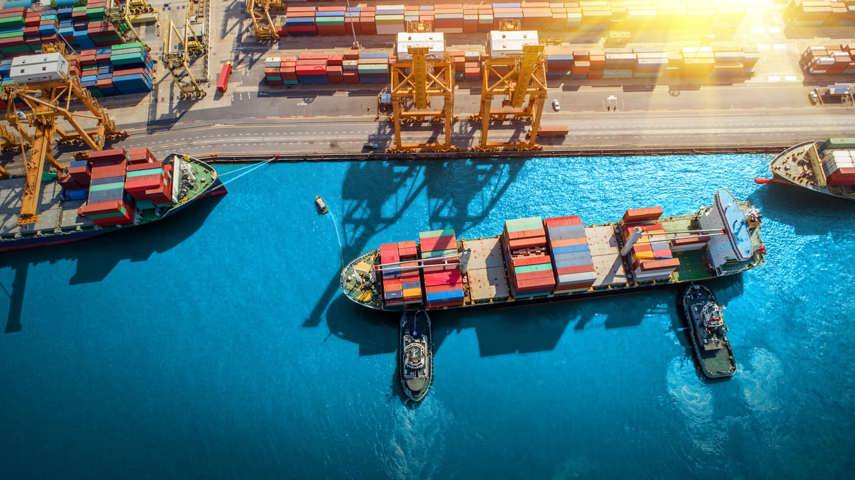
If your business involves inventory - whether you are a wholesaler, manufacturer or retailer - freight charges are one of the key costs of doing business. Transportation costs are often highly uncertain; a merchant may not know the freight cost for a shipment until the carrier sends an invoice weeks later.

8 factors affecting transportation costs
Although freight costs are often uncertain, they are not a total mystery; as with most outgoings, they depend on a range of economic circumstances. Let’s look at some of the factors that affect transportation costs.
1. Fuel costs
The cost of maritime and land transport is, of course, related to the price of fuel.
As fuel prices fall, container ships and cargo trucks become cheaper to operate and the price of transport goes down. Savings (or losses) are passed on to consumers - either indirectly or through a fuel cost component built into a carrier’s pricing model.
And of course, if fuel prices increase, carriers will pass the additional expense on to merchants.
2. The labor market for commercial drivers
Increasing wages and competition among carriers for truck drivers can have an upward impact on transportation costs.
As older drivers retire, carriers may struggle to find operators for their vehicles.
Recruiting new drivers is difficult; the job can be tough and typically requires a different class of driver licence (courses to certify new commercial drivers can take weeks or even months to complete).
Moreover, many logistics companies struggle to compete with ‘in-house’ truck driving positions that tend to pay better and may offer less stress.
3. Demand for freight
Pricing depends on the volume of product being shipped by operators just as much as it depends on the actual, underlying costs.
If capacity is limited, operators may be inclined to sell limited space at a premium.
On the other hand, if business is slow, a carrier may be talked into offering a more competitive rate, at least in the short term.
4. Customer loyalty
Merchants who can offer a carrier regular, consistent business are well placed to receive a preferential rate, especially if demand across the industry is low.
5. Vehicle capacity
Some trucking companies operate an older, smaller fleet.
While these trucks are entirely adequate, newer trucks are designed to maximize storage space, allowing a truck to split space even further.
6. Government regulation
Regulation may directly impact the freight forwarding industry and its bottom line; for example, governments often set maximum driving hours for commercial operators.
Other government regulation may also impact freight costs; for example, New Zealand’s Emissions Trading Scheme has been estimated to increase freight costs by several dollars for every thousand kilometers travelled.
7. Geopolitical events
International maritime shipping has become fraught with the dangers of pirates and rogue governments.
The World Bank estimates that the losses from global piracy amounted to approximately USD$18 billion in 2014, pushing up the price of everyday freight as carriers were forced to change shipping routes and pay higher insurance premiums.
8. Your reputation as a merchant
The price quoted by a carrier will, at least in part, reflect the carrier’s expectations as to the packing of pallets and the time to load. If you have a reputation for loading quickly, you may be charged a slightly smaller rate to compensate.

LTL transportation costs
LTL, or ‘less than truckload’ shipping, generally refers to palletised and oversized parcel shipments that do not fill a carrier’s truck.
LTL consignments are usually packed on wrapped pallets or in large containers - the carrier then pools multiple customers’ freight together to fill a truck for shipping. LTL operators essentially occupy the space between full truckload shipping (FTL), on one hand, and parcel carriers on the other.
How is LTL pricing determined?
LTL freight rates are typically a function of several factors including weight, size, route and distance, level of service and the freight class.
The relevance of weight and size is obvious; heavier shipments will increase fuel consumption and larger shipments will occupy more space in the trailer. Longer distances are typically more expensive to ship although, interestingly, rates along shipping lanes to closer destinations can sometimes be more expensive.
Service level essentially refers to delivery timeframes. Each LTL operator will have their own service standards, although they can typically be broken down into three categories:
- Standard freight
- Express freight, which has a shorter delivery target
- Guaranteed freight, where the carrier agrees to deliver your freight by a specified time.
Although determining the specific freight class of a shipment can be difficult, freight class essentially comes down to the characteristics of the goods being shipped, the density (size and weight) of the shipment or some combination of the two.
Goods-based classing involves assigning higher prices to freight that is fragile, dangerous or otherwise more difficult to ship.
Is LTL freight cheaper?
Although FTL has price advantages for large, regular deliveries, LTL typically works out cheaper than hiring an entire truck and trailer for infrequent deliveries or partial shipments.
Parcel carriers often compete with LTL carriers at the lower end, encouraging businesses to break shipments down into smaller units. That said, LTL is usually a better option than parcel carriers as businesses can reduce handling and benefit from economies of scale.
It is a good idea to work with a freight broker, at least initially, to identify which LTL operators can meet your preferred service standard for the lowest price.
Freight brokers can also assist you to determine the most advantageous freight class available and to advise on off-peak or backhaul options.
Types of common LTL transportation fees
If you are just starting to use LTL for shipping or want to understand more about the process, a good place to start is with your third-party logistics (3PL) provider.
The 3PL provider is able to identify what accessorials different shippers may need.
Individual, first-time shippers will incur different accessorials to business shippers. Deciphering what accessorials you need is one of the most important parts of LTL.
1. Fuel surcharges
This accessorial fee is very prevalent with LTL shipments. An added fee is incurred due to a high consumption of diesel gas. The excess fuel charges can differ with carriers so it’s important to compare different options.
2. Residential fees
When a shipment item needs to be picked up or delivered to a residential address additional fees are often charged. Any non-business location will generally be billed for this accessorial fee. Residential sites are extra since they do not have a loading dock. Therefore, a lift gate may be required.
3. Lift gate
If your shipment is being picked up or delivered to a location without a loading dock, another accessorial fee will be charged. The LTL carrier needs a lift gate to execute the movement of pallets as the pallets need to move up and down to be transported around.
4. Extreme length
If shipments are oversized they will need specific equipment to be transported. Shipments that are bigger than average are charged more for the inconvenience of catering to obscure sizes.
5. Specific delivery time
When shipments need to be delivered at a specific time, an accessorial fee will most likely be charged. These deliveries require more coordination and they often spend time liaising with a facility representative.
These are a few of common accessorial fees that LTL shipments charge. Each situation is unique and will incur different accessorial fees.
For example, a business who is trying to move inventory stock to another warehouse will get charged differently to a business moving inventory stock to a residential area.
If the warehouse can only accept the inventory stock delivery at a certain time, more fees could be incurred.
It’s best to make yourself aware of the potential accessorial fees and work diligently to mitigate them so it doesn’t come as a shock at the end. Being proactive and comparing carriers is a viable option to making your LTL shipping experience a positive one.
